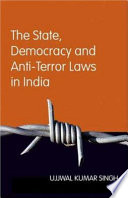
The State, Democracy and Anti-Terror Laws in India
By - Singh, Ujjwal Kumar
Floor
-
Floor 1
Published
-
Sage Publications, New Delhi, 2007
ISBN 10 - 0761935185
ISBN 13 - 9780761935186
Book Status
-
1 Qnty Available with us.
Subject
-
Terrorism--Prevention
Shelf No
-
13
Call Number
-
344.5405325 SIN
Physical Description
-
(345 pages)